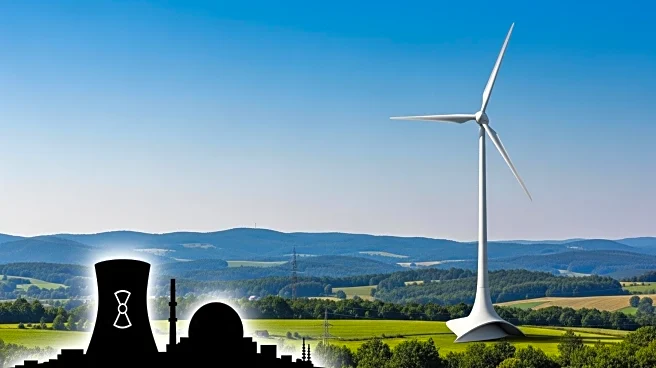What's Happening?
Poland is experiencing significant delays in its nuclear energy program, which aims to build 6 to 9 GW of nuclear power starting with three AP1000 reactors on the Baltic coast. Originally scheduled for completion by 2033, the timeline has now been pushed to at least 2036. The program faces challenges due to financing uncertainties and the absence of conditions that historically enabled nuclear success, such as alignment with military objectives. Poland's nuclear ambitions are further complicated by its commitment to the Non-Proliferation Treaty, which prohibits the development of nuclear weapons. Meanwhile, Poland is rapidly expanding its renewable energy capacity, with significant growth in solar and wind power, which is reducing coal dependency and creating surplus electricity during peak renewable generation hours.
Why It's Important?
The delays in Poland's nuclear program highlight the challenges of integrating large-scale nuclear power into a grid increasingly dominated by renewables. Nuclear power plants require steady output, which can lead to inflexibility and the need for costly grid adjustments, such as storage solutions and demand response systems. The situation underscores the broader energy transition challenges faced by countries balancing nuclear and renewable energy sources. Poland's experience serves as a cautionary tale for other nations considering nuclear energy as part of their decarbonization strategies, emphasizing the importance of flexibility and adaptability in energy planning.
What's Next?
Poland may need to reassess its energy strategy, potentially increasing investments in renewable energy and grid flexibility solutions to accommodate the growing share of wind and solar power. The government might explore additional state aid or EU funding to support the nuclear program, though approval from Brussels remains uncertain. As Poland continues to expand its renewable capacity, it may focus on enhancing interconnections with neighboring countries and developing offshore wind projects to further reduce coal dependency and improve energy security.
Beyond the Headlines
The geopolitical implications of Poland's reliance on U.S.-licensed nuclear technology could pose risks, especially amid volatile American politics and strained alliances. Additionally, the financial burden of nuclear energy contrasts sharply with the success of renewables, which have attracted private and public investment more readily. Poland's experience may influence other countries' energy policies, highlighting the need for strategic alignment and risk management in large-scale energy projects.









